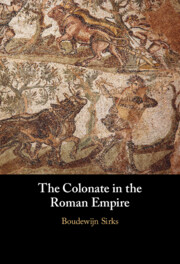
-
Select format
-
- Publisher:
- Cambridge University Press
- Publication date:
- January 2024
- January 2024
- ISBN:
- 9781009172585
- 9781009172608
- Dimensions:
- (229 x 152 mm)
- Weight & Pages:
- 0.707kg, 360 Pages
- Dimensions:
- Weight & Pages:
- Subjects:
- Ancient History, Classical Studies, Legal History, Law
You may already have access via personal or institutional login- Subjects:
- Ancient History, Classical Studies, Legal History, Law
Book description
The fourth and fifth centuries AD gave rise to a particular phenomenon in the Roman Empire: the colonate. The colonate involved the fiscal regulation of a relationship of surety between landowners and farmers in the later Roman Empire and played a major role in agrarian and social relations, with implications for these farmers' freedom of movement and transmission of status. This study provides a clear and comprehensive reassessment of the legal aspects of the phenomenon, embedding them as far as possible in their social and economic contexts. As well as taking the innovative approach of working retrogradely, or backwards through time, the volume provides a thorough assessment of two critical sources, the Theodosian and Justinian Codes, and will therefore be an invaluable resource for students and scholars of Roman law and the agricultural and social history of late antiquity.
Awards
Short-listed, 2025 Late Antiquity Book Prize, Virtual Centre for Late Antiquity
Reviews
‘This book presents a meticulous and comprehensive analysis of ancient Roman normative texts, primarily drawn from the Codes of Theodosius and Justinian, pertaining to the institution of the colonate. It will undoubtedly serve as a valuable reference for those engaged in research on late antiquity, in particular thanks to the insights it offers into the economic and social changes of the period through its application of new historical-legal methods.’
Kamil Sorka Source: Bryn Mawr Classical Review
Contents
Metrics
Altmetric attention score
Full text views
Full text views help Loading metrics...
Loading metrics...
* Views captured on Cambridge Core between #date#. This data will be updated every 24 hours.
Usage data cannot currently be displayed.
Accessibility standard: Unknown
Why this information is here
This section outlines the accessibility features of this content - including support for screen readers, full keyboard navigation and high-contrast display options. This may not be relevant for you.
Accessibility Information
Accessibility compliance for the PDF of this book is currently unknown and may be updated in the future.


